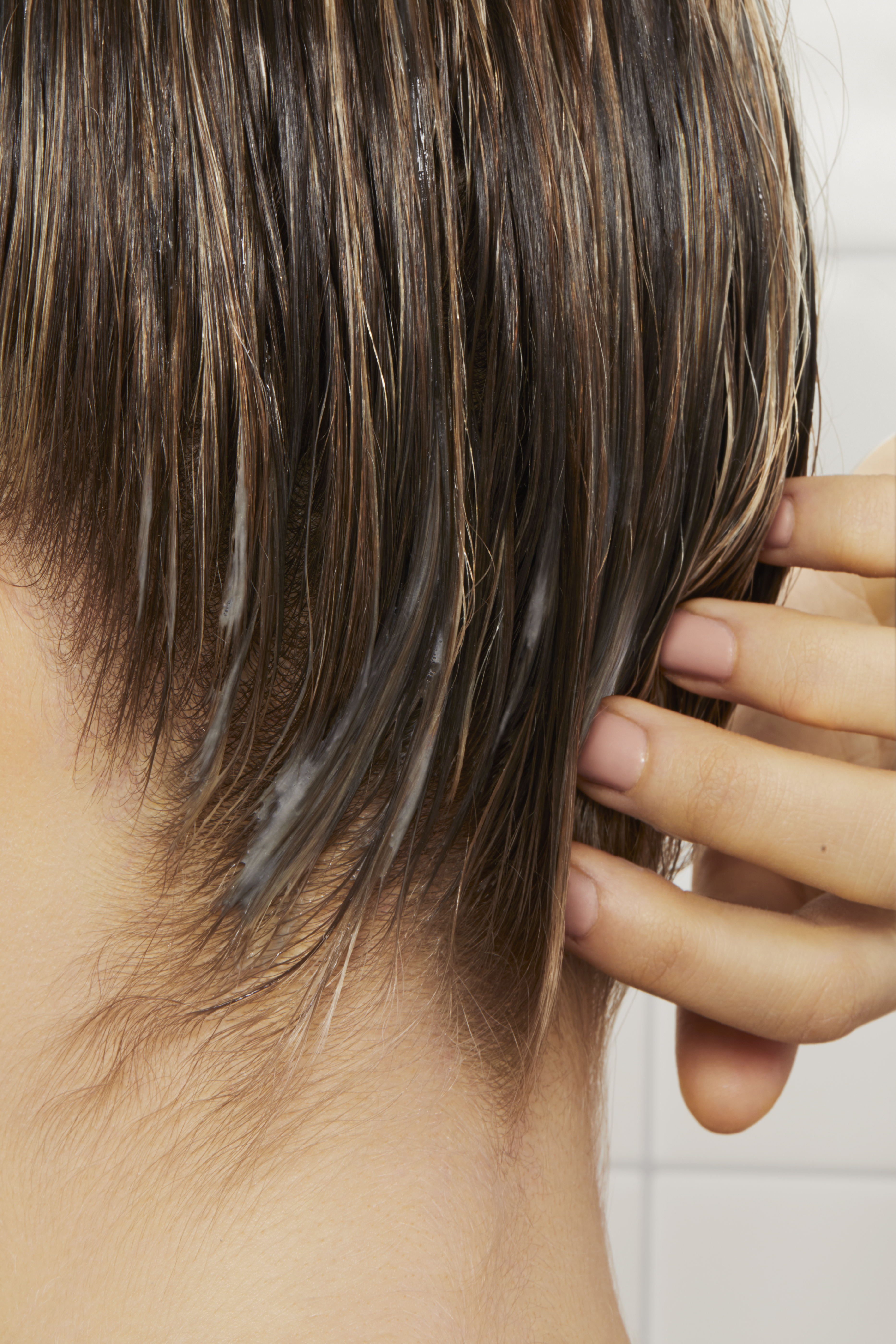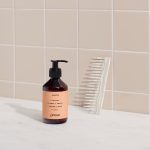1. Be prescriptive about your shampoo and conditioner
It’s hard to assign one simple haircare solution to all scalp conditions, since the underlying causes vary vastly. But when it comes to shampoo and conditioner, Hill says it’s important to pick formulas that are specific to your scalp situation. That customization is key for recovery and continued abatement. If you aren’t sure which condition pertains to you, then jump down to Tip #5 and have an expert assess the situation.
Also, Hill suggests applying the products with a nozzle applicator head, so it allows you to distribute them directly to the scalp. You may have to transfer your shampoo and conditioner into a new bottle that has a nozzle head. “This method requires that the shampoo should be applied to scalp dry before wetting. The applicator bottle allows the shampoo to be applied directly to the scalp allowing the active ingredients to work directly on the scalp for a deeper penetrating cleanse, before emulsifying with water,” she says.
Here are Hill’s simple haircare tips for the most common scalp conditions.
Dry scalp, lacking lipids and moisture
“Use a moisturizing shampoo rich in fatty acids to help restore the lipids and moisture to the scalp’s microbiome. Limit shampooing to no more than 2-3 x a week. It is essential to allow the scalp to not be overly cleansed. Use a conditioner based on your hair fabric type and texture.”
Dehydrated scalp, lacking water
“Use a gentle shampoo that is not overly rich and not customized to combat flakes. Any normal gentle shampoo is advisable. A dehydrated scalp is a result of a dehydrated body, so increase water intake. Limit shampooing to no more than 2-3 times a week. It is important to allow the microbiome to not be overly manipulated. Use a conditioner based on the hair type and texture.”
Dry flakes
“Use a shampoo that has active ingredients such as selenium sulfide, salicylic acid, sulfur, or zinc. Shampoo as often as needed yet alternate between flake-fighting active ingredients and gentle daily shampoos to maintain the balance of the scalp’s microbiome. It is important to slow down the cellular turnover of the scalp when managing flakes. It is the over activity of the scalps cells that create the embarrassing flakiness. Use a conditioner based on hair type and texture.”
2. Have a scalp-care regimen (…scalp massage included!)
If you are experiencing dry or itchy scalp (as opposed to flakiness), then a scalp treatment might be a great remedy for you. And in doing so, you now have a scalp-care regimen in addition to your hair-care one. “In general, scalp treatments remove debris, exfoliate the scalp, and enhance circulation,” Hill says. “I prefer oil-based pre-shampoo scalp treatments used weekly for normal to mild scalp conditions, and before any shampoo in more severe cases. Applying scalp treatments at night and shampooing in the mornings is another effective way to manage dry scalp.”
She adds that flakes, on the other hand, should be balanced in other ways, since many scalp treatments encourage too much cellular turnover, which is exactly what you want to control and mitigate when addressing flakes.
Hill says to accompany scalp treatments with a scalp massage or scalp brush. “Start your massage at the nape of the neck, using both hands and working your fingers up the head to the crown. Then work from the base of the ear to top of the head on both sides. There’s a lot of area to cover so take your time. Spend 3 to 5 minutes massaging the appropriate oil or mask into the scalp to soften skin cells, exfoliate and remove debris to encourage blood flow.”
3. Use soothing, clean hair stylers
Sometimes the root of the problem is the hair styling products you use. They may aggravate the scalp or throw off its very delicate microbiome and pH levels. “Keep hair styling products as simple and clean as possible, as well as fragrance free, and free of synthetic-based alcohols,” Hill says. “Anything being left on the scalp and hair, after shampooing and conditioning, should be cooling and restorative to dry scalp, as opposed to encouraging cellular turnover (flakiness).”
4. Audit your diet
What goes into your body is often reflected on your face, scalp, and hair—as in, if you eat unhealthily, your skin, scalp, and hair quality often plummets. “Diet plays a large role in managing dry itchy scalps,” Hill adds. “Minimize foods that are high in yeast, and limit high-inflammation diets.” Below are examples of these types of foods that aggravate the scalp.
Yeast: High-sugar fruits (bananas, dates, raisins, grapes, and mango); grains that contain gluten (wheat, rye, barley, and spelt); certain meats (deli meats and farm-raised fish); refined oils and fats (canola oil, soybean oil, sunflower oil, or margarine)
High-inflammatory diets: Sugar and high-fructose corn syrup (table sugar / sucrose, and high-fructose corn syrup—HFCS—are the two main types of added sugar in the Western diet); artificial trans fats (think frozen dinners, microwave popcorn, non-dairy creamer, fried foods, etc); vegetable and seed oils; refined carbohydrates (white flour, white bread, white rice, soda, pasta, breakfast cereal, and added sugars); excessive alcohol; processed meat.
5. Have a trichologist assess your unique condition
It’s no shock that Hill’s final tidbit is to seek the help of a professional like her: “Identifying the true source, depending on the severity of the problem, may require a root cause scalp analysis from a trichologist,” she says. “[Consider] medical testing such as blood test and skin biopsy. Because scalp health is affected by a combination of factors, it is often challenging to isolate one particular cause, plus each factor may or may not serve as a trigger to create the onset of the abnormal scalp condition.”
Shop products featured in this story








Comments [2]
I was really interested to see the diet portion, but guys 🙁 if we can’t eat all of that, then what do we eat? The one, concrete thing I did was to switch to almond milk. Can you do a follow up article listing what IS good to eat for the scalp and hair? Thanks! – Prose user 🎀
Hey there, that is a great suggestion! We will share your feedback with our editorial team ❤️
-Keely, Prose Community Manager